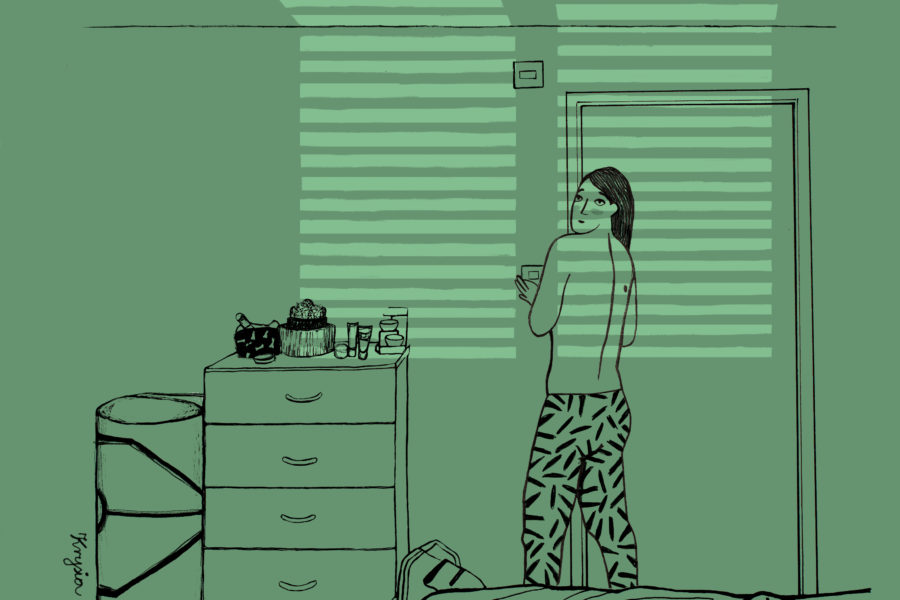When I was fifteen, a woman from a feminist organisation visited my school to have a discussion with us about equality. I don’t remember much of what she said, but I do remember that she started the discussion with the question “who here is a feminist?”

Who here is a feminist?

Questions Without Answers
Each month, Olivia Scher chooses a personal question to ask herself, discussing her ideas, thoughts and feelings about life and the world around us. In exploring a range of topics she dares herself to be brutally honest in the pursuit of insight acquired through questions without answers.
When I was fifteen, a woman from a feminist organisation visited my school to have a discussion with us about equality. I don’t remember much of what she said, but I do remember that she started the discussion with the question “who here is a feminist?”
Understandably, at that age, I had a very basic understanding of the concept of feminism. I roughly knew that it involved equality, and that these issues affected me as a young woman – I guess the gender pay gap was the extent of my knowledge, and even then, did I truly understand it? These words “gender pay gap”, floated around mainstream media, and so my understanding of feminism was attached to this concept, and to be honest, that was about it. I lacked a meaningful understanding of feminism and was yet to discover its vast significance in my life.
Whilst thinking about whether I should put my hand up to signal my stance, I looked around the room to see who and how many others had put their hands up first. Just over half had. When the right people and right number had raised their hands, I felt confident enough to lift mine into the air. And thus, fifteen-year-old me was a feminist, I guess.
Since then, I have come a long way in my understanding, and I am entirely sympathetic to my younger self. Like most people that age, how could I not have been more concerned with social approval than with ideals of equality? After all, my genuine analysis as to whether I should raise my hand to that question was to ask myself “is feminism something I should be associated with?” However, I realise now that my teenage brain was picking up on something real. I was aware that as mainstream as feminism may or may not be, in many spaces, feminism is not well-liked. It is not respected. And it is not accepted.
Really, I was reflecting on two bigger questions:
Do people – (most likely men) – perceive feminism to be a positive thing? And if so, should I stand anywhere near it?
And, even more importantly,
Will taking this stance make me seem like a difficult person? Wait no, not just a difficult person, a difficult woman?
(Not) being difficult. This is a concept I’ve been aware of from a very young age. It is a concept and a narrative that has influenced and affected the behaviour of women especially, for thousands of years, and I have fallen victim to it many times over.
To stamp a woman with the label of being difficult simply because she has an opinion, is to ignore her words, remove her dignity and reject her identity. At its most extreme, inherent to the idea of a woman having an opinion is the idea that this woman is difficult. For many women, consciously or subconsciously, this stress factor may be present every time they open their mouths, filtering and determining the words they feel safe to say. Alongside all the other pressures of social approval, it’s safe to say that this is an impossible burden to bear.
Imagine being known to be a difficult woman. Not just a difficult woman, but the difficult woman. “Out of all of the women I know, you are the difficult one. You’re the woman who can’t take a joke, you’re the woman that’s always preaching, you’re the woman who hates men, you’re that woman, that strange woman who won’t just shut the fuck up.”
What an identity. Who would want that?
I’ve had friends who were more courageous than me, willing to share their opinions – opinions with which I agreed – described in this way to me, so as to deter me from having my own opinions. Little did I know that they were teaching me how to speak for myself.
And yet when men have opinions, especially when they express their feminist leanings, we’re so impressed. I may even let out a sigh of relief. “Thank God, I won’t have to battle against empty-minded sexist bullshit right now, brilliant, what a win.” As if it were not the bare minimum – an expectation of reality – that the person standing in front of you should believe in the equality of all people and respects your personhood. The double standard says it all.
This narrative goes:
“How refreshing, he has an opinion, good for him. And wow, feminism too? How enlightened! I previously have had no respect for feminism when women had brought it up, but now, although the ideas are exactly the same, having this information packaged for me by a man has actually made me respect it more. How weird. I wonder why that’s happened. Actually, no I don’t. Anyways.”
The sheer regularity and pervasiveness of sexism in this world is exhausting. I know people that agree with feminist principles but refuse to adopt the word “feminist” because of its associations. I’ve had to persuade friends in my life that calling a woman a slut is wrong. I have experienced double standards at university, both overtly and covertly. Ask any woman – we are not alone in this.
We all suffer when sexism prevails. People of every gender are held back and are victims of discrimination. And whilst I can see the progress made by myself and by my generation, sometimes I just want to scream.
My fifteen-year-old self was scared to have opinions. Today I can still be scared, but I’m learning to stand up for what I believe in.
Looking back at that fifteen-year-old girl, I feel for her, her innocence, her ignorance and her social inhibitions. I was silent on a topic that I was yet to become passionate about. I was disinterested in feminism, for fear of being rejected. I was taught by society to be scared to have an opinion, and at times it worked. But not now. After all, what would the world look like if women didn’t speak up? I don’t want to know.
Olivia Scher, Columnist
Header image via Unsplashed





Leave a Comment